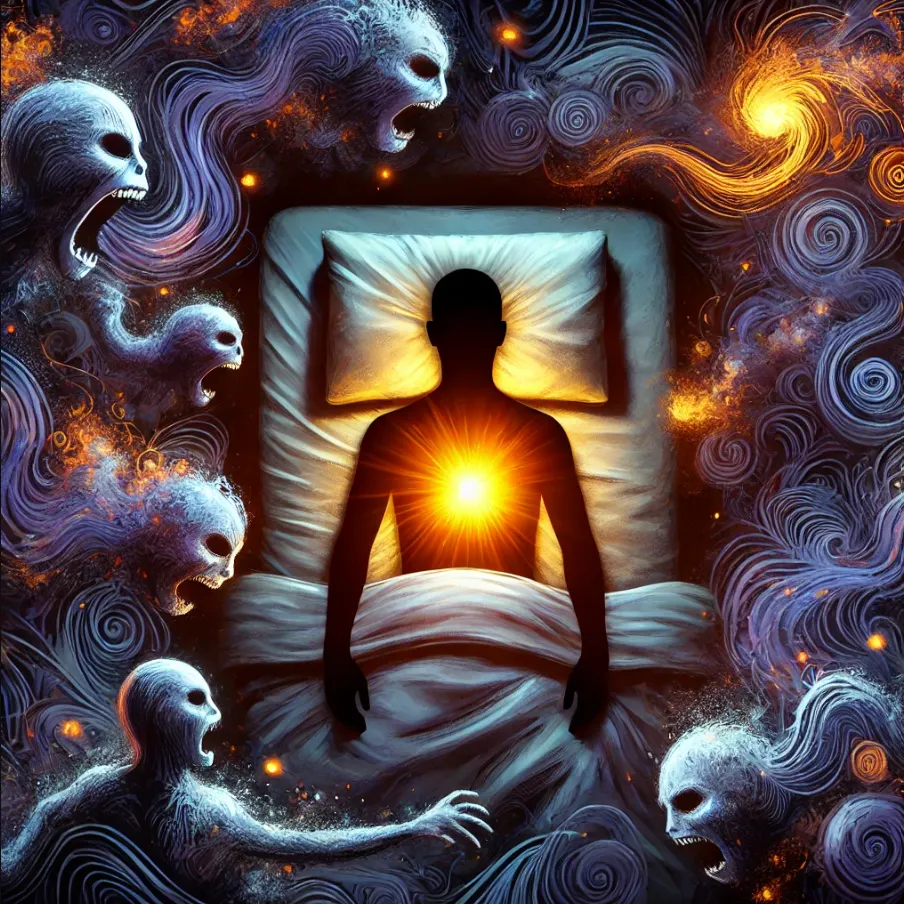Unlocking the Secrets of Nightmares: How to Decode the Hidden Messages in Your Dreams
Have you ever woken up in the middle of the night, heart racing, after a particularly vivid and unsettling dream? Nightmares are something we all experience from time to time, and they often leave us feeling shaken or anxious. But what if these disturbing dreams are more than just random images? What if they hold important messages from your subconscious, waiting to be unraveled?
In this post, we’ll explore how you can begin to interpret your nightmares and understand the deeper meaning behind them. Whether rooted in stress, unresolved emotions, or spiritual symbolism, nightmares offer powerful insights into our inner world. By learning how to decode these dreams, you can transform them from sources of fear into valuable tools for self-awareness and growth.
Key Takeaways:
- Nightmares often reflect unresolved emotions, stress, or trauma: They serve as intense, emotionally charged experiences that mirror what's happening in your subconscious.
- Recurring themes in nightmares highlight unresolved issues: Common symbols like falling or being chased can point to feelings of insecurity or avoidance that need attention in waking life.
- Nightmares can act as powerful tools for personal growth: By confronting and interpreting their messages, you can transform fear into opportunities for emotional healing and self-awareness.
- Spiritual perspectives view nightmares as messages from the unconscious: Nightmares can indicate energy imbalances, such as blocked chakras, or offer opportunities for shadow work and transformation.
- Practical steps like dream journaling and meditation can help decode nightmares: Keeping a dream journal, reflecting on recurring themes, and using meditation are effective ways to understand and process the deeper meaning of your dreams.
- Nightmares are a path to greater emotional freedom: Embracing them with curiosity allows for personal growth, turning unsettling experiences into stepping stones for transformation.

1. What Are Nightmares and Why Do They Happen?
Nightmares are more than just unsettling dreams; they are intense and emotionally charged experiences that can leave you feeling anxious or frightened. But why do they happen, and what do they reveal about our inner world? To better understand nightmares, it’s important to explore both their causes and their potential meanings.
Common Causes of Nightmares:
- Stress and Anxiety: High levels of stress or anxiety often manifest as nightmares. Whether it’s a work-related deadline or an emotional struggle, your mind processes these pressures through unsettling dream imagery.
- Trauma: People who have experienced trauma, such as an accident or a loss, often relive these moments in their dreams, with nightmares acting as a form of emotional processing.
- Unresolved Emotions: Nightmares can act as a mirror to your subconscious, bringing unresolved fears, guilt, or suppressed feelings to the surface.
- Lifestyle Factors: Sometimes, lifestyle choices like eating heavy meals before bed, certain medications, or irregular sleep patterns can trigger nightmares.
“Nightmares are the brain’s way of coping with fear and stress,” explains clinical psychologist Dr. Deirdre Barrett. “They allow us to process what we can’t face during the day.”
Recent Study:
A 2023 study published in the Journal of Sleep Research found that individuals experiencing high levels of stress during the COVID-19 pandemic reported a 35% increase in nightmare frequency. This underscores the strong connection between real-world stressors and our dream experiences (Smith et al., 2023).
[https://onlinelibrary.wiley.com/doi/full/10.1111/jsr.13609]
2. Historical and Cultural Significance of Nightmares
Nightmares have intrigued and perplexed people for centuries. Different cultures and traditions have offered unique interpretations of these distressing dreams, often seeing them as more than just random mental events. From ancient civilizations to modern spiritual practices, nightmares have been regarded as important messages from beyond.
Nightmares in Ancient Civilizations
- Ancient Egyptians: In ancient Egypt, nightmares were thought to be messages from the gods. Dreams were often interpreted by priests, who believed that certain visions—especially disturbing ones—carried warnings or divine guidance.
- Indigenous Cultures: Many Indigenous cultures, such as Native American tribes, viewed nightmares as spiritual encounters. The famous dreamcatcher was created to trap negative dreams and protect sleepers from malevolent spirits.
- Medieval Europe: In medieval Europe, nightmares were commonly attributed to supernatural forces. People believed that evil spirits, such as the incubus or succubus, visited them during sleep to cause fear and discomfort.
Modern Spiritual Perspectives
- Today, many spiritual traditions see nightmares as tools for transformation. Rather than simply bad dreams, they are viewed as opportunities for self-reflection and growth.
- Some modern spiritualists believe that nightmares highlight areas in life where we need healing or change. By confronting the fears or emotions that arise in these dreams, we can address unresolved energy blockages or psychological wounds.
“Nightmares in ancient times were often seen as messengers from the divine or warnings about the future,” notes dream historian Dr. Kelly Bulkeley. “This belief persists in modern spirituality, where dreams continue to hold symbolic importance.”
3. Psychological Insights into Nightmares
From a psychological standpoint, nightmares are often seen as windows into the subconscious mind. They can reveal hidden fears, unresolved trauma, or emotional conflicts that we might not fully acknowledge during waking hours. By understanding the psychological roots of nightmares, you can begin to make sense of why certain themes keep appearing and how they connect to your inner world.
Freudian Theory
Sigmund Freud, the father of psychoanalysis, believed that nightmares are expressions of repressed desires, fears, or unresolved conflicts. According to Freud, disturbing dreams provide an outlet for thoughts or emotions that we suppress during the day. In this view, nightmares act as a kind of pressure valve, allowing our mind to explore forbidden or uncomfortable topics in a “safe” way while we sleep.
“Dreams are the royal road to the unconscious,” Freud famously said, indicating that dreams—especially nightmares—offer a direct glimpse into the repressed corners of our psyche.
Jungian Perspective
Carl Jung, another pioneer in psychology, saw nightmares not as mere reflections of repressed desires but as essential parts of our journey toward self-awareness. Jung believed that nightmares arise from our shadow self—the part of our personality we avoid or reject. These dreams, while unsettling, give us the opportunity to confront and integrate the darker aspects of our nature.
“Nightmares force us to face our shadow,” explains Jungian analyst Dr. Robert Johnson. “They reflect the parts of ourselves we fear or deny, but through that confrontation, we can achieve emotional healing.”
Modern Psychological Views
In contemporary psychology, nightmares are often linked to stress, trauma, or anxiety. Therapists today use techniques such as cognitive behavioral therapy for insomnia (CBT-I) to help individuals explore their nightmares and reduce their emotional impact. Nightmares can be particularly common in those who have experienced traumatic events, such as PTSD sufferers, where the dream acts as a replay of the emotional distress.
Psychologist Dr. Rosalind Cartwright suggests, “Nightmares allow us to rehearse our fears. They provide an opportunity to work through what scares us most, helping us to emotionally prepare for these challenges in real life.”
Common Themes and What They Mean Psychologically
- Falling: Often represents feelings of insecurity or lack of control in waking life.
- Being Chased: Suggests avoidance—perhaps you’re running from a fear, a responsibility, or a difficult truth.
- Teeth Falling Out: This can symbolize anxiety about appearance, personal power, or fear of aging.

4. Spiritual and Symbolic Meanings of Nightmares
While psychological explanations can provide valuable insight, many people turn to spiritual interpretations to uncover deeper, symbolic meanings behind their nightmares. In spiritual traditions, nightmares are often seen as opportunities for transformation, messages from the unconscious, or reflections of energy imbalances.
Nightmares as Catalysts for Personal Transformation
In many spiritual practices, nightmares are viewed as tools for self-growth and evolution. Rather than being seen as purely negative, they are seen as invitations to confront our deepest fears and unresolved emotions. By doing so, we allow ourselves to grow and move forward in life.
“Nightmares are like mirrors, reflecting back to us what we need to work on for our soul’s growth,” says spiritual teacher Eckhart Tolle. “When we face them consciously, we transform fear into understanding and strength.”
Energy Blockages and Chakras
From an energetic perspective, nightmares may signal blockages within the body’s chakra system. Chakras are considered to be energy centers within the body, and when one is out of balance, it can manifest in both physical and emotional ways—nightmares being one of them.
- Throat Chakra (Communication): If you experience recurring nightmares where you are unable to speak or express yourself, it could signal a blockage in the throat chakra. This may point to issues with communication or holding back your truth in waking life.
- Root Chakra (Security): Nightmares involving falling or instability could indicate an imbalance in the root chakra, related to feelings of insecurity or fear for your personal safety.
Common Symbols and Their Spiritual Meanings
In spiritual dream interpretation, certain symbols hold deeper meanings. Here are a few common nightmare themes and their possible spiritual interpretations:
- Water: In spiritual symbolism, water often represents emotions or the unconscious mind. A nightmare involving turbulent waters may indicate that you’re grappling with overwhelming emotions or unresolved emotional turmoil.
- Animals: Different animals in nightmares can carry specific meanings. For example, a snake might represent transformation, fear of change, or healing, depending on the dream’s context.
- Darkness: Darkness is frequently associated with fear of the unknown or hidden aspects of the self that you may be avoiding.
Nightmares as Shadow Work
In spiritual practices, especially those influenced by Carl Jung’s concept of the “shadow,” nightmares can be seen as part of the process of shadow work. This is the practice of acknowledging and integrating the parts of ourselves that we suppress or deny. Nightmares often bring these aspects to light, helping us see what needs healing or acceptance.
“When we avoid dealing with our shadow, it manifests as fear in our dreams,” says spiritual coach Deborah King. “By facing these aspects of ourselves, we not only resolve the nightmares but also experience emotional liberation.”

5. How to Interpret Your Nightmares: Practical Steps
Now that we’ve explored the historical, psychological, and spiritual dimensions of nightmares, how can you begin to interpret and work through your own? Understanding your nightmares can lead to emotional healing, greater self-awareness, and even personal transformation. Here are some practical steps you can take to make sense of your nightmares and their messages.
1. Keep a Dream Journal
Writing down your dreams as soon as you wake up is one of the most effective ways to decode their meaning. Keep a journal by your bedside and capture as many details as you can remember—symbols, emotions, colors, or specific events. Over time, you may notice patterns that reveal hidden messages or unresolved feelings.
- Tip: Focus on the emotions you felt during the nightmare. Were you scared, anxious, or powerless? These emotions often mirror what’s happening in your waking life.
2. Reflect on Recurring Themes
If you experience recurring nightmares, it’s important to pay attention to repeated themes or symbols. Whether it’s being chased, falling, or losing something valuable, recurring nightmares suggest unresolved issues that need to be addressed.
- Ask Yourself: What am I avoiding or not confronting in my waking life? Why does this theme keep showing up? Recurring dreams will often persist until you deal with the root cause.
3. Use Meditation for Clarity
Meditation can be a powerful tool to help you connect with the deeper meaning of your nightmares. A guided meditation focused on relaxation and emotional release can bring clarity and reduce the anxiety that often follows a nightmare. By quieting the mind, you create space to understand what your subconscious is trying to communicate.
- Try This: After a nightmare, take a few minutes to sit in stillness, focusing on your breath. Visualize the emotions from the dream dissolving, and ask your subconscious for insight into its meaning.
4. Explore Dream Symbols
Nightmares often contain symbolic elements that can hold powerful meaning. Take time to research or meditate on the symbols that appeared in your dream. Were there animals, specific colors, or settings that stood out? The symbolism can offer insight into areas of your life that need attention or healing.
- Example: If you often dream about being chased, this may symbolize avoiding a difficult truth, fear of confrontation, or an unresolved emotional issue.
5. Engage in Shadow Work
As mentioned earlier, nightmares often reflect the parts of ourselves that we suppress—our shadow self. By practicing shadow work, you can confront and integrate these hidden aspects, reducing the frequency or intensity of your nightmares. This could involve journaling, therapy, or simply reflecting on the emotions and fears brought up in your dreams.
- Practice: Ask yourself, “What part of myself am I afraid to face?” or “What unresolved issue is my nightmare trying to reveal?” By embracing your shadow, you bring light to areas that need healing.
FAQ Section: Unlocking the Secrets of Nightmares
1. What causes nightmares, and why do we have them?
Nightmares are often triggered by stress, unresolved emotions, trauma, or lifestyle factors like irregular sleep patterns or certain medications. They serve as the brain's way of processing fear, anxiety, and emotional experiences that we may not fully acknowledge during the day.
2. Are recurring nightmares trying to tell me something?
Yes, recurring nightmares often signal unresolved issues or persistent emotions in your waking life. Themes like falling, being chased, or losing something valuable may represent feelings of insecurity, avoidance, or anxiety that need to be addressed.
3. Can nightmares be beneficial for personal growth?
Absolutely! Nightmares can be powerful tools for self-awareness and emotional healing. By confronting the fears or unresolved emotions that arise in your nightmares, you can gain deeper insight into your subconscious and transform these experiences into opportunities for growth.
4. How can I start interpreting my nightmares?
Start by keeping a dream journal to capture the details of your nightmares as soon as you wake up. Reflect on recurring themes or symbols, and use meditation to connect with the emotions behind the dreams. Over time, you’ll notice patterns that can help you understand what your subconscious is communicating.
5. Do nightmares have spiritual meanings?
In many spiritual traditions, nightmares are seen as messages from the unconscious or reflections of energy imbalances. For example, they might indicate blocked chakras or areas of life where healing is needed. Nightmares are often viewed as catalysts for personal transformation, offering opportunities to confront and heal unresolved issues.

Conclusion: Embracing Nightmares as Tools for Growth
Nightmares may be unsettling, but they carry important messages from your subconscious. Whether they reveal unresolved fears, spiritual guidance, or psychological stress, nightmares can be powerful tools for personal growth and healing. By interpreting your nightmares through journaling, meditation, and self-reflection, you can unlock their deeper meaning and use them as stepping stones toward emotional and spiritual freedom.
The next time you wake from a nightmare, instead of fearing it, ask yourself: What is this dream trying to teach me? When we approach nightmares with curiosity and openness, they become opportunities for transformation.
Disclaimer:
The content provided in this article is for informational and educational purposes only and should not be considered a substitute for professional medical, psychological, or spiritual advice. While the interpretation of nightmares can offer valuable insights into emotional and subconscious processes, it is important to consult with a licensed therapist, psychologist, or healthcare professional if you are experiencing frequent, distressing nightmares or dealing with trauma-related issues. Additionally, spiritual interpretations of dreams are based on personal beliefs and may not align with everyone’s experiences or practices. Always approach dream analysis with an open mind and consult experts when needed for personalized guidance.
